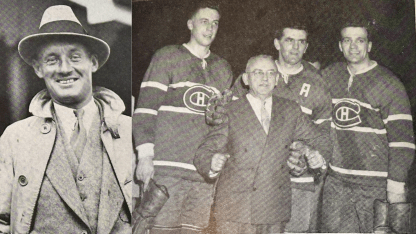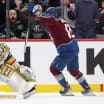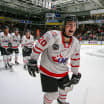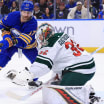Legendary hockey reporter Stan Fischler writes a weekly scrapbook for NHL.com. Fischler, known as "The Hockey Maven," shares his humor and insight with readers each Wednesday.
This week, he tells a zany story about a feud between two NHL executives which, implausibly, led to each of the protagonists creating historic dynasties.
Conn Smythe and Frank Selke had been lifelong hockey buddies dating back to the 1920s when they helped create the Toronto Maple Leafs and later build Maple Leaf Gardens. It was an NHL marriage that included Stanley Cup championships in 1932 and 1942 and seemed destined to last forever.
Smythe was the boss and Selke his trusted aide, and sometimes they were mistaken for each other. But that friendship would end harshly -- and irrevocably -- after Smythe went overseas with a Canadian artillery battalion shortly after D-Day on June 6, 1944.
Before entering military service, Smythe delegated Selke to run the hockey operations but with one important provision: he was ordered not to make any trades without Smythe's approval. And as a Major in the military, Smythe expected his orders to be followed. Unfortunately, a pair of very promising teenage stickhandlers unknowingly botched things up and got Selke in such deep trouble that he was eventually forced to abdicate his job.
One of the young players was Frank Eddolls, a defenseman with enormous promise who would have been on Toronto's active list but was serving in the Royal Canadian Air Force.
The other was center Ted Kennedy, who was property of the Montreal Canadiens but became unhappy with his experience at camp. When word circulated that Kennedy was available, Selke jumped at the chance to obtain the prospect for the Maple Leafs.
"(Hockey Hall of Famer) Nels Stewart, who had coached Kennedy said, 'Get this boy for Toronto,' because he is certain to make good," Selke wrote in his autobiography, "Behind the Cheering."
The deal, Kennedy for Eddolls, was consummated Sept. 10, 1943, but without Smythe's permission. Meanwhile, someone in the Maple Leaf Gardens high command sent a cable to Smythe in France, tipping him off about the trade. Not surprisingly the Little Major was livid.
"We were ordered -- in a cable from Smythe -- to cancel the deal but it was ignored," Selke said.
Kennedy joined the Maple Leafs just before the 1944 Stanley Cup Playoffs and had one goal and one assist in five games.
"I told sportswriter Ed Fitkin that I thought we might have acquired a superstar," Selke said, "but the fact still remained (in Smythe's view) I had been guilty of a breach of discipline."
Smythe, who almost died from severe wounds sustained when a British ammunition truck was bombed near his battery, also discussed the trade in his autobiography, "If You Can't Beat 'Em in the Alley."
"Certainly, I was furious about not even being consulted," he wrote. "Eddolls had joined the Air Force soon after signing with us and I thought trading him was a stinking trick to play on a man who was going overseas.
"My anger was entirely at not being consulted. It was as if I no longer had a voice in what was done. I was sore at everyone involved and wrote to let them know exactly how I felt."
By the time Smythe returned to Maple Leaf Gardens late in 1945, a battle was brewing over the team's presidency and Smythe was the front-runner looking for votes. Meeting with Selke, Smythe told his formerly loyal sidekick he was counting on his support against executive board members Ed Bickle and William Alfred Hawley (Bill) MacBrien.
Selke refused to support his boss and, according to Smythe, "Frank thought he would get my job."
That was the final dagger in their relationship. Smythe was eventually elected president and never stopped blaming Selke for Toronto missing the playoffs in 1945-46.
"Smythe had me on the carpet publicly and in the press," Selke said. "According to Smythe, it was my selection of material that led to the team's downfall."
Hockey historian Eric Zweig, author of "The Toronto Maple Leafs: The Complete Oral History," opined: "Smythe wasn't really being honest. Selke had taken great pains to sign younger players during the war years."
Said Smythe: "Selke's eternal loyalty and five cents would get me a cup of coffee, but I was not surprised. I was going to be president, without Selke's votes, and it would prove that I didn't need him."
Selke got the message and resigned in May 1946, moving on to become general manager of the Canadiens. Four months later, the roster was rebuilt for the 1946-47 season.
"Smythe would use many of the young players Selke had signed to launch a Maple Leafs youth movement." Zweig wrote.
The Maple Leafs won the Stanley Cup in 1947, 1948, 1949 and 1951. His star on all four championship teams and a fifth going back to 1945 was Ted Kennedy.
The Canadiens reorganized under Selke by building a farm system across Canada, his first Stanley Cup title with Montreal coming in 1952-53, with Eddolls on that team. Eddolls later played five solid seasons for the New York Rangers. He died of a heart attack at age 40 on Aug. 13, 1961, while playing golf with future Hall of Famer Stan Mikita.
Montreal's dynasty took shape during the 1955-56 season, when it won the first of five consecutive championships, a feat never matched in NHL history.
"I believe that the 1959-60 Canadiens may well have been the best hockey team ever assembled," Selke said.
In an abstract sense, he could thank Smythe.


















